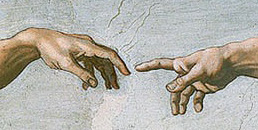 Among YEC arguments for a justifying a young earth from Scripture is the claim that Jesus believed in a young earth. This statement is often based on the passages in which Jesus was teaching about divorce. Because of the way that Jesus referred to the origin of humans, it sometimes is inferred that He believed in a young creation. Making this assertion requires two things: First, that the Lord’s statements are clearly referring to specific points in time, and second, that they indicate something of Jesus’ belief on a topic other than the one being discussed.
Among YEC arguments for a justifying a young earth from Scripture is the claim that Jesus believed in a young earth. This statement is often based on the passages in which Jesus was teaching about divorce. Because of the way that Jesus referred to the origin of humans, it sometimes is inferred that He believed in a young creation. Making this assertion requires two things: First, that the Lord’s statements are clearly referring to specific points in time, and second, that they indicate something of Jesus’ belief on a topic other than the one being discussed.
It’s worth giving both Scripture references that are in view, and also the context of the references.
And Pharisees came up to him and tested him by asking, “Is it lawful to divorce one’s wife for any cause?” He answered, “Have you not read that he who created them from the beginning made them male and female, and said, ‘Therefore a man shall leave his father and his mother and hold fast to his wife, and the two shall become one flesh’? So they are no longer two but one flesh. What therefore God has joined together, let not man separate.” They said to him, “Why then did Moses command one to give a certificate of divorce and to send her away?” He said to them, “Because of your hardness of heart Moses allowed you to divorce your wives, but from the beginning it was not so. And I say to you: whoever divorces his wife, except for sexual immorality, and marries another, commits adultery.” Matthew 19:3–9 (ESV) (emphasis added)
And Pharisees came up and in order to test him asked, “Is it lawful for a man to divorce his wife?” He answered them, “What did Moses command you?” They said, “Moses allowed a man to write a certificate of divorce and to send her away.” And Jesus said to them, “Because of your hardness of heart he wrote you this commandment. But from the beginning of creation, ‘God made them male and female.’ ‘Therefore a man shall leave his father and mother and hold fast to his wife, and the two shall become one flesh.’ So they are no longer two but one flesh. What therefore God has joined together, let not man separate.” Mark 10:2–9 (ESV) (emphasis added)
One clear challenge to this assertion is explained nicely in a blog by JW Wartcick: “Jesus was a Young Earth Creationist” – A Problem. In summary, JW points out that a strictly literal interpretation of the phrases in question would place the creation of humans at the beginning of the creation process, while the Bible clearly states that humans were at the end of the creation process. Clearly one cannot take the phrase strictly literally, so it’s necessary to choose how much literal interpretation is needed to support the desired YEC view.
Alternatively, JW points out that the phrase could simply be an idiom, much we use terms like “old as dirt” to mean really old.
All this suggests that the first condition doesn’t hold water — He can’t be making precise statements about points in time.
So right off the bat there is a clear problem with a strictly literal interpretation. However, this also seems to create a second challenge for determining Jesus’ creation belief, since Jesus is teaching about divorce, not creation. The mention of creation is a secondary reference meant to drive home the God-ordained unity of a married couple. If we take a step back and look at the nature of His teachings overall, it’s clear that such secondary references can take many different forms. He often used parables in which specific items are clearly figurative. He also used references like the size of mustard seeds (Mark 4:30-32) and vultures gathering (Matt 24:28) that we sometimes have difficulty interpreting.
In all these cases, placing too much emphasis on the secondary reference can result in confused understanding. So in this case, we have such a secondary reference that is somewhat ambiguous in its interpretation. Why then are we to conclude the very specific interpretation claimed by YEC?
The answer, of course, is that the only reason for that conclusion is trying to make a point about something that Jesus wasn’t talking about. The goal is not just to give Jesus’ words a particular meaning, but to know what His inner thoughts were when His own words were ambiguous. That seems like a pretty arrogant, even dangerous, thing to do.
Instead, perhaps we should keep a humble heart, and when several possibilities are reasonable, adopt a quiet perspective. Seems like such an approach would honor the Lord better than stating something that is derived from human analysis as fact.
 A recent tweet shared by True Creation, originally from Philip Cottraux (@DepthsPentecost), made me think about how people may change the way they view Scripture depending on how where they see God’s hand. Here is the original tweet:
A recent tweet shared by True Creation, originally from Philip Cottraux (@DepthsPentecost), made me think about how people may change the way they view Scripture depending on how where they see God’s hand. Here is the original tweet:
 One of the clear messages of the New Testament is that the work of Jesus was sufficient for accomplishing salvation. Whenever the gospel is presented, the good news is that Jesus died for our sins and was raised on the third day. Acceptance of this and acknowledgment of Jesus as Lord brings one into the family of God.
One of the clear messages of the New Testament is that the work of Jesus was sufficient for accomplishing salvation. Whenever the gospel is presented, the good news is that Jesus died for our sins and was raised on the third day. Acceptance of this and acknowledgment of Jesus as Lord brings one into the family of God. Have you ever been to someplace with someone you know well that is filled with many different sounds, perhaps a loud party or convention, and found that you could pick their voice out from the cacophony even though it may not have been any louder than the other competing voices? This happens because we are able to discern the familiar voice with a special familiarity.
Have you ever been to someplace with someone you know well that is filled with many different sounds, perhaps a loud party or convention, and found that you could pick their voice out from the cacophony even though it may not have been any louder than the other competing voices? This happens because we are able to discern the familiar voice with a special familiarity. Among YEC arguments for a justifying a young earth from Scripture is the claim that Jesus believed in a young earth. This statement is often based on the passages in which Jesus was teaching about divorce. Because of the way that Jesus referred to the origin of humans, it sometimes is inferred that He believed in a young creation. Making this assertion requires two things: First, that the Lord’s statements are clearly referring to specific points in time, and second, that they indicate something of Jesus’ belief on a topic other than the one being discussed.
Among YEC arguments for a justifying a young earth from Scripture is the claim that Jesus believed in a young earth. This statement is often based on the passages in which Jesus was teaching about divorce. Because of the way that Jesus referred to the origin of humans, it sometimes is inferred that He believed in a young creation. Making this assertion requires two things: First, that the Lord’s statements are clearly referring to specific points in time, and second, that they indicate something of Jesus’ belief on a topic other than the one being discussed. There are many debates surrounding the right way to interpret certain Scripture passages, especially in Genesis. To a large extent, it boils down to the question of whether or not to take a passage literally. A common approach for thinking about this is the “plain sense” perspective — “If the plain sense makes sense, then seek no other sense”. Regardless of where this statement originated, it seems to express a common perspective. The idea is that we should take the words at their normal meaning, and the text at its obvious meaning unless there is some reason to do otherwise.
There are many debates surrounding the right way to interpret certain Scripture passages, especially in Genesis. To a large extent, it boils down to the question of whether or not to take a passage literally. A common approach for thinking about this is the “plain sense” perspective — “If the plain sense makes sense, then seek no other sense”. Regardless of where this statement originated, it seems to express a common perspective. The idea is that we should take the words at their normal meaning, and the text at its obvious meaning unless there is some reason to do otherwise. At the ascension of Christ, the disciples were given direction regarding their mission to carry the Gospel throughout the world. These words still speak to us today.
At the ascension of Christ, the disciples were given direction regarding their mission to carry the Gospel throughout the world. These words still speak to us today. One of the common arguments against evolution is that it requires death before mankind’s fall. Often, the argument is that creation was described as “very good” before the fall, and it doesn’t seem reasonable for a very good creation to include billions of years of death.
One of the common arguments against evolution is that it requires death before mankind’s fall. Often, the argument is that creation was described as “very good” before the fall, and it doesn’t seem reasonable for a very good creation to include billions of years of death. In a recent online discussion about creation viewpoints, I was challenged to reject evolution because I was “not evolved fish” since I was “made in God’s image”. The idea seemed to be that creation in God’s image was a physical reality, or at least involved some aspects of our physical being. Because of that, our bodies could not have evolved since that would be incompatible with God’s image.
In a recent online discussion about creation viewpoints, I was challenged to reject evolution because I was “not evolved fish” since I was “made in God’s image”. The idea seemed to be that creation in God’s image was a physical reality, or at least involved some aspects of our physical being. Because of that, our bodies could not have evolved since that would be incompatible with God’s image. One complaint about a figurative interpretation of the first half of Genesis is that it calls into question one’s interpretation of the rest of the Bible. If one doesn’t believe the straight-forward narrative statements in Genesis 1-11 are literal, then why should one believe any of the straight-forward narratives in the Bible? For example, if we take the first half of Genesis figuratively, is there any reason to take the second half as literal history?
One complaint about a figurative interpretation of the first half of Genesis is that it calls into question one’s interpretation of the rest of the Bible. If one doesn’t believe the straight-forward narrative statements in Genesis 1-11 are literal, then why should one believe any of the straight-forward narratives in the Bible? For example, if we take the first half of Genesis figuratively, is there any reason to take the second half as literal history? In the discussion of how best to interpret Genesis 1, the debate is often characterized as a choice of literary type, based on perceived content. A recent
In the discussion of how best to interpret Genesis 1, the debate is often characterized as a choice of literary type, based on perceived content. A recent